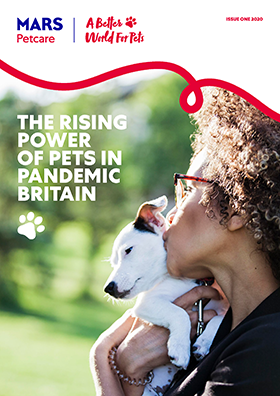
Britain’s cats and dogs have emerged from lockdown licking their lips as pet treats sales boom, the first annual petcare market report from Mars Petcare reveals.
The new report – The Rising Power of Pets in Pandemic Britain – looks to a positive future for the pet industry in the wake of the coronavirus pandemic.
Across the board, treats value sales surged year on year from the week of the UK’s first covid-19 case in February to the partial lifting of lockdown 12 weeks later. Dreamies saw 12.9% growth, while Pedigree grew 11.8% as treating occasions rose 12% in the weeks following lockdown on 23rd March.
“The pet treats boom shows the crucial role pets play in providing companionship, particularly in times of stress,” said Nick Foster, category and marketing director of Mars Petcare UK.
“The last few months have been challenging for everyone, so it makes sense that many have sought to ease the strain by treating their pets as they were forced to stay inside. Treating is a way of strengthening the bond we have with our pets, rewarding good behaviour and looking after their health needs. It also gives us a powerful emotional reward.”
The wider pet food and litter market saw sales climb 3.4% in the 12 weeks to 16 May with treats’ growth gathering pace as lockdown continued. In the final four weeks, cat treats’ growth accelerated to 7.7%. Over the same period, positive dog treats grew by 8.8%.
With one in three owners only ever treating their pets with functional products like dental chews, this boom in treating represents a significant opportunity, particularly for specialist pet retailers.
“The significant growth of the category shows just how expandable the pet treats market is,” says Foster.
“Dedicated pet shops have the opportunity to educate pet owners on the different products available and, by encouraging them to buy a wider repertoire of treats for a greater number of uses – such as to show love, reward, train or address health issues – we can drive more growth.”
Pet food and litter is a highly planned category, with 73% of shoppers researching which products are best for their animals before making a purchase. Pet treat purchases are much less planned, with 44% of sales being made on impulse.
“Retailers can capitalise on pet treats’ growth potential by disrupting shoppers’ journeys in store and online with clear range segmentation and increased space,” he said.
“Seasonal sales events are also an opportunity, with 40% of millennial pet owners saying they spend as much on treating their pets as they spend on friends on special occasions.”
Mars says the signs are good for further growth after breeders and pet homes reported huge demand for cats and dogs as Brits sought to ease the isolation of lockdown with new pets. By 2025, it is estimated that one in three pet care shoppers will be millennial.
This generation has greater tendency to spend on pet services and accessories, in addition to spending more on their pets at Christmas and other gifting occasions. Specialist pet retailers can future proof their businesses by offering a wider range of goods and services which will appeal to this generation who now, more than ever, have the opportunity to buy a pet.
“Employers are becoming more amenable to staff working from home, making it easier for people to get the pet they’ve always dreamed of,” said Nick, adding that Mars Petcare is now forecasting compound annual growth of 2.4% over the next five years.
“This is another reason why the future is bright for the pet food and treats category.”


